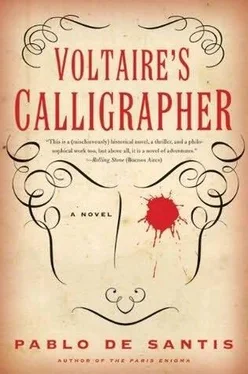Von Knepper walked without looking back or to either side. His stride was so long I practically had to run to keep up. We crossed over the river and passed through a market, where I nearly lost him among the vendors leaving for the night. He stopped at an iron gate, and I had to step back so as not to be seen. We had come to the cemetery. The guard was expecting him and let him in without a word. I watched Von Knepper walk through the trees and the graves until he was swallowed by shadows.
I now had to choose between the graveyard and the house and decided on the latter. The maid tried to stop me at the door, but I shouted Clarissa’s name and she came to my rescue. Once again she led me to the room with the piles of broken toys, Kolm’s walking stick now among them.
“I saw your father at the cemetery. Would he be visiting your mother’s grave?”
“My mother died elsewhere, and my father never went to her grave.”
“So what is he looking for there at this time of night?”
“I don’t know. If you’re so interested in my father, why didn’t you follow him?”
“Because I wanted to come here.”
“Then enough about the cemetery. Your shoes are already caked with mud. The more you talk, the muddier things will get.”
She offered me a chair with a cracked leg, and I nearly fell off it. She sat down on a trunk. The room was nearly dark. I thought I could hear the whirring of little machines in the corners.
“It’s been a long time since I’ve spoken to anyone. My father isn’t much of a conversationalist.”
“They say he’s the greatest maker of automatons in Europe.”
“He’s made a tiger and a ballerina and won over the courts of Portugal and Russia. Sometimes I thought all the time he spent around machines allowed him to discover the secret workings of the world, and his every wish was granted. But then automatons went out of style, and now my father isn’t moved by art but by greed and fear.”
“What is he afraid of?”
“He’s afraid of Abbot Mazy and his calligrapher, who’s writing a book that never ends, using his enemies’ blood as ink.”
Darkness had filled the space as we talked, pushing us closer together. I reached to put my arm around her, in that cowardly, imperceptible way that tries not to appear deliberate. Clarissa gave no sign of approval or disapproval, and I wondered whether I might have touched her so softly she hadn’t even noticed. Emboldened by her apparent acquiescence, I moved closer still. She didn’t reject my caresses, but she didn’t return them either. The things around us gradually began to move: the Dutch dolls and the dismembered soldiers and the little Greek gods all moved. Everything moved but Clarissa, who sat perfectly upright, as if pretending to be made of stone.
Von Knepper opened the door, and I now felt as if I were caught between two wax statues. He stared at me without seeing. He had something to say-he was going to throw me out of his house, maybe even report me to the police-but it was obvious the very thought of speaking to me annoyed him. His coat was soaking wet and his boots were caked with mud. His mind was still elsewhere, out there among the graves, and not yet fully present. Now that his body was warming up, it was likely his thoughts would return, too.
“My daughter is ill,” Von Knepper said. “She often falls into this state.”
He passed his hand in front of her eyes. Clarissa didn’t move.
“Please don’t visit her again. Her attacks are brought on by strangers.”
“But I didn’t go near her.”
“You don’t need to. Her condition is very sensitive and can detect strangers before they even enter a room.”
“But you have your daughter shut up in here like a prisoner.”
“It’s her illness that imprisons her. If I were to let her lead a normal life, she’d fall into a trance and never wake up. Don’t try to understand. Go now, now that you can, now that you won’t run into anyone outside.”
I could feel an extraneous cold. It came from either the girl’s immobility or the profound impact the night had had on Von Knepper. He crossed the room and, before I knew it, threw Kolm’s walking stick at me. The metal hand closed around my throat. If it had possessed its former destructive force, it would have killed me. Instead, all I felt was a slight squeeze that would barely leave a mark.
“Tell your friend I’ve adjusted the mechanism. There’ll be no need for us to see one another again.”
Mathilde no longer had any hold over me; Clarissa filled my thoughts as my hand traced letters on a woman’s skin. It wasn’t my fantasy to write on her, but I imagined she came to my room late one rainy night, and I slowly explored a message written in an unknown language.
Kolm and I met at a tavern frequented by cemetery workers, where I gave him back his walking stick. He asked me how much it had cost; I told him a lot, but he could make it up to me with a little favor. We were free to speak here without fear of being overheard by the indiscreet or spies; gravediggers only ever talked to one another-nothing else interested them. The long isolation they were subjected to by their profession had led them to distort language and create one of their own. References to tombs, darkness, marble, or death couldn’t be interpreted literally; they could mean any number of things, depending on how they were combined. The music of that language was at times as dry and deliberate as shovelfuls of earth and at others vaguely solemn, interspersed with Latin phrases they had learned from funeral inscriptions.
After years of filthy boots walking through it, the tavern now simply had a dirt floor. All bags and tools were left at the door. Medical students would come to buy bones, and goldsmiths stolen jewelry.
To reimburse me for the repairs, I asked Kolm to find out why Von Knepper went to the cemetery. It took jug after jug of awful wine before Kolm gave in to my pestering and grudgingly agreed to help. He led me over to a red-faced man sitting alone, talking to no one. Forlorn in a corner, he was reading and rereading a thick book filled with tiny notations. He would lick his fingertip to turn the page and then point at a spot in the book, as if he had finally found the very word he’d spent years looking for. I recognized him as the guard who had opened the gate for Von Knepper.
“Remember me, Maron? It’s Kolm.”
Maron wasn’t used to social interaction and was surprised these words were addressed to him.
“I remember you. I thought you’d left us. Why’ve you come to this place full of undesirables?”
“I was looking for you.”
“Why would anyone want to see me?”
“The key to the cemetery. I want to invite my friend here to a nighttime stroll through the graves.”
“I’ve opened and closed that gate for forty years and never lent the key to anyone.”
“We’ll offer you a little something as if we believed that were true.”
Obeying the executioner’s signals, I put two, three, four coins on the table before he had me stop.
“And we’ll give you one more if you let us take a look at that book.”
Maron pocketed the coins. Unlike every other man there, his hands were clean and white, not a mark of any kind. He spoke in a low voice:
“Just a quick look. Don’t get it dirty.”
Kolm took the book and handed it to me. I was initially confused and flipped through the pages, more to pretend I knew what Kolm wanted than to look for anything specific. He whispered that I should pay attention to the most recent burials. Next to each name was a grave site. I studied each line, searching for the lie that twists the stroke, sends it off course, and then forces it back to its original form but only with extreme effort. Kolm thought we should keep Von Knepper’s name out of it, in case Maron went behind our backs. It was best if our purpose remain hidden.
Читать дальше
Конец ознакомительного отрывка
Купить книгу












